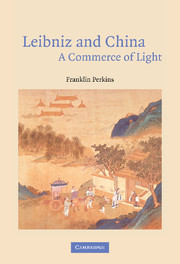2 - Order and diversity in Leibniz's metaphysics
Published online by Cambridge University Press: 16 November 2009
Summary
ORDER, DIVERSITY, AND PLURALISM
The challenge in examining Leibniz's interest in China and cultural exchange is to show that this interest is not accidental; to show that Leibniz encourages exchange not in spite of his philosophical system but because of it. In establishing an intrinsic connection between Leibniz's practical pluralism and his philosophy as a whole, the difficulty is in how he avoids the position we have seen in Descartes and Spinoza, that, while all cultures may be roughly equal, the study of other cultures is irrelevant to the pursuit of truth, because the pursuit of truth comes through individual self-reflection. On the face of it, separating Leibniz from this position looks impossible. Leibniz is classed as a “rationalist,” best known for his advocacy of innate ideas and necessary truths, and his concern with logic, meant to facilitate the use of necessary truths. This traditional approach to Leibniz, though, typified by the Russell–Couturat line of interpretation, has been consistently undermined by recent Leibniz scholars, along three lines. One line of emphasis is on Leibniz as a more pragmatic, empirical, and fallibilistic investigator of the world. A second line shifts away from Leibniz as a logician to Leibniz as motivated by practical and theological concerns, in this case his concern with cultural exchange. The third line focuses on Leibniz as a pluralistic thinker, trying to bring different parties and schools together. These three lines of interpretation are mutually supportive and I hope my work here contributes to all three.
- Type
- Chapter
- Information
- Leibniz and ChinaA Commerce of Light, pp. 45 - 107Publisher: Cambridge University PressPrint publication year: 2004



